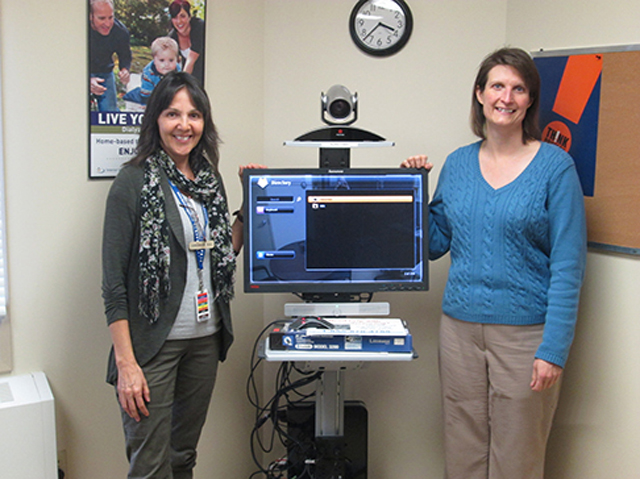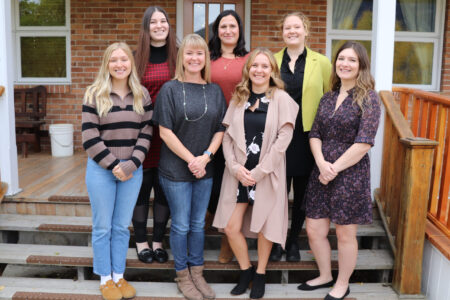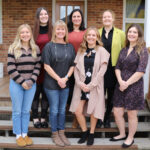Paving the way: telehealth clinics for post-transplant follow up
Transplant patients living in rural communities can be faced with a number of challenges when travelling long distances to attend an appointment. But for Paula Smith, a new telehealth service for post-kidney transplant patients has eliminated all of these.
Paula’s kidney function first started to decline more than 10 years ago. Then, in 2010, while Paula’s kidney was functioning at only 15 per cent, the worst happened – her husband passed away.
“Just five weeks after my husband died, I had a peritoneal dialysis catheter implanted in my abdomen and was getting prepped for dialysis,” recalls Paula.
For three and a half years, Paula was on dialysis waiting for a kidney transplant and in January 2014 her brother, a perfect match, volunteered one of his.
“Everything just fell into place and then moved really quickly. I had my transplant in February 2014,” says Paula. “There were no complications for either of us – I have never felt this happy, healthy, and alive in my entire life.”
For surgery, Interior Health transplant patients travel to Vancouver, but the routine follow-up appointments are done locally. The closest post-transplant clinic to Paula, who lives in Cranbrook, is more than 200 kilometres away in Trail (three hours each way). Paula is one of many in IH who travel for specialty appointments.
Kim McDuff, Transplant Redesign Project Coordinator, along with her colleagues at the Kootenay Boundary Regional Hospital Kidney Transplant Clinic in Trail, identified a need to find other options for patients who have to drive long distances for follow-up appointments.
They decided to develop a pilot project where post-transplant patients were given the option to attend their clinic appointment in Cranbrook and connect to Trail via telehealth.
“Telehealth offers a way to provide adequate and continuous care for post-transplant patients not living in Trail,” says McDuff.
In collaboration with BC Transplant, telehealth appointments were offered for the first time for post-transplant patients. The pilot ran from November 2014 to May 2015 with 12 patients using the service.
Georgi Winger is the renal nurse at Cranbrook Wellness Centre who facilitates the appointment between the patient and the Trail Kidney Transplant Clinic.
“Although we’ve only been doing telehealth with post-transplant patients for a short time, the feedback has been nothing but positive,” says Winger.
“They are so grateful to be able to meet with the transplant team and receive the care they need without having to take the time to travel to Trail. Prior to telehealth, Paula would have to take a day off work for her appointments in Trail, plus spend money on gas and meals. I believe telehealth has reduced the emotional and financial stress of many of our patients which, I’m sure, has a positive impact on their health and well-being.”
During the follow-up appointment, Georgi records Paula’s blood pressure, weight, and pulse; checks for edema (excess of fluid); and relays the information via telehealth videoconferencing to the team in Trail. On the receiving end is Teresa Buckley, transplant clinic nurse, and transplant nephrologist, social worker, and dietitian.
“It’s expensive for people to take an unpaid day off work and stressful to drive the mountain pass to Trail,” says Teresa. “With telehealth, this health-care service is more accessible and increases the continuity of care.”
Through telehealth, Paula is able to connect with each of the care providers involved in her post-recovery care plan without having to drive to Trail each time.
“To me, there is no difference in the service provided,” says Smith. “I’m just glad I don’t have to make the drive. On a winter day like today, I would have cancelled. It’s such a benefit for patients who would otherwise have to travel.”
Telehealth for transplant patients is expected to expand to other areas of IH.
“Right now we are looking at other rural sites in IH with renal nurses who can facilitate these appointments,” says Buckley. “We have also just begun to facilitate appointments for pre-transplant patients, before they go to Vancouver for surgery.”
The first pre-transplant appointment took place in early January and more are expected throughout 2016.

























Comments